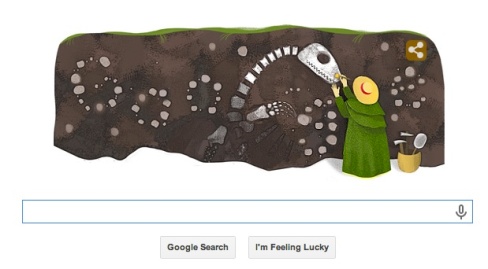Posted by Jill S. Schneiderman in feminism, gender, geology, history of science, science, women in science.
Tags: Israel, Palestine, Study Trip, Vassar

And since Google is celebrating Anning, whom I’ve always associated with ammonites, an extinct group of marine invertebrate animals (phylum: mollusca; class: cephelopoda), I’ve posted below a photograph of two of my students from our March 2014 study trip in which we visited the famous “Ammonite Wall” in the Negev Desert.

Pliny the Elder referred to these fossils as the “horns of Ammon” because their coiled shape was reminiscent of the ram’s horns worn by the Egyptian god Ammon. The photo below shows the remarkable exposure of a laterally extensive sedimentary layer chock full of ammonite fossils. That’s yours truly standing on the steeply dipping bedding plane.

And note the the great piece in The Guardian about Anning and the other lost women of geology.
Posted by Jill S. Schneiderman in feminism, food justice, Vegetarianism/veganism.

“Everything should taste like Bacon.” Really? Bacon lip balm, Baconnaise, Bacon Salt, Bacon MMMvelopes, and all of it Kosher-certified? I’m really confused. I heard this supposed-to-be cute story on NPR this morning about “Baconentrepreneurs”Justin and Dave and their line of Bacon-tasting products, the NPR story focussing specifically on Bacon Shaving Cream.
But I’m not confused on this: even without the shaving cream, it had to be a guy-gimic. And not girly guys, I mean manly men. I went to their website, to the “about” section and found, no surprise, that they characterize themselves as:
… just two regular guys who love grilling and football on Sunday afternoons, eating until we can’t get off the couch and of course, the taste of great bacon. And it’s our dream to make everything taste like bacon.
I know it’s not really bacon in their products and I know it’s supposed to be weird and satirical but I was bugged. Why encourage and try to gratify the bacon-craving? Why exploit the manly man trope? I won’t go on about these fellas.
What I really want to do is call attention to QueerVeganFood.com, a blog by Sarah E. Brown that promotes a vegan diet for the sake of improved personal and planetary health. Queer Vegan Food is a plant-source only site, posting recipes that don’t include animal products of any kind. And it posts truly queer recipes –like chocolate-covered kelp noodles, for instance–in an effort to expand the vegan culinary world beyond vegan cuisine which imitates the non-vegan food world.
NPR should cover that!
Posted by Jill S. Schneiderman in Barry Commoner, connectthedotsmovement.org, earth community, environmental justice, environmentalism, feminism, fracking, Precautionary Principle, Sandra Steingraber.
This is cross-posted at CommonDreams.org, SpeakOut, and RH Reality Check.
When, as a 21-year-old geology major I chose scientist and activist Barry Commoner as my presidential candidate, I was lambasted by some of my lesbian sisters at Yale for wasting my vote. But upon reading his obituary in the New York Times, I feel proud of the choice I made back then. Barry Commoner, who died September 30, deserves to be remembered as a visionary scientific thinker who advocated for connecting the dots between components in systems of oppression. Barry Commoner, who died on Sunday at the age of 95.
Barry Commoner, who died on Sunday at the age of 95.
I’d like to remember Commoner as a feminist environmentalist. Why? For one thing, Commoner split with conservation groups like the Sierra Club and the National Wildlife Federation who subscribed to Paul Ehrlich’s theories articulated in The Population Bomb. These organizations, at the time, essentially blamed women for enviromental degradation asserting that it was a byproduct of overpopulation. Commoner was a scientist of the Rachel Carson variety. As the Times put it, his overarching concern was “a radical ideal of social justice in which everything was indeed connected to everything else… He insisted that the planet’s future depended on industry’s learning not to make messes in the first place, rather than on trying to clean them up.”
This line of thinking leads directly to scientists and activists today who insist on seeing the connections between energy, transportation, agricultural and industrial systems that emphasize technological progress and financial profits disregarding consequences such as groundwater contamination, global climate change, and the health of all living beings. Too, Commoner could well be remembered as the direct ancestor of scientists today like Sandra Steingraber, a signatory of the Wingspread Statement on the Precautionary Principle, a scientist who has devoted her life to explaining the ways that chemical contaminants endanger health, and who currently leads the fight in New York against fracking. For Commoner planted the seed for precaution with his precept that “Preventing a disease is far more efficient than treating it.”
And I don’t know if in his late years Commoner was aware of the work of activist Ashley Maier, cofounder of Connect the Dots, an organization that uses the social-ecological model, that individuals live within multiple spheres of influence, to address connections between environment, human and animal well-being. But I’d like to think that his longevity might have been connected to the hope he could have derived from the work of younger activists like Maier.
Though I never spoke with my graduate school mentor, paleontologist Stephen Jay Gould, about Commoner, it didn’t surprise me to read his comment in a review of Commoner’s book, Making Peace with the Planet, that it “suffers the commonest of unkind fates: to be so self-evidently true and just that we pass it by as a twice-told tale.” Though he eschewed the politics of science, Steve’s view that Commoner was “right and compassionate on nearly every major issue” rings true as we contemplate as obvious yet imperative Commoner’s prescription of solar energy, electric-powered vehicles, and massive recycling programs, among others, as components of a plan to reverse the formidable, “radically wrong” path of the planet.




 Barry Commoner, who died on Sunday at the age of 95.
Barry Commoner, who died on Sunday at the age of 95.